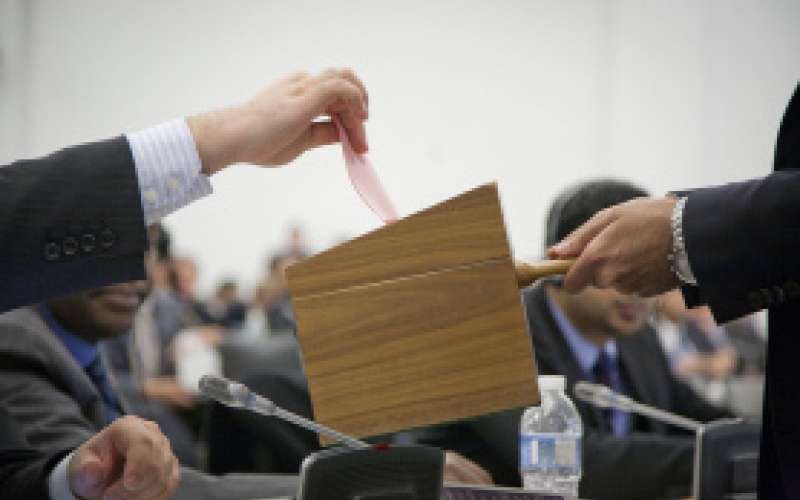ICC seeks Asia-Pacific judge

Why is there an election taking place?
Filipino Senator Miriam Defensor Santiago resigned her position as an ICC judge for health reasons in June last year. She had been elected in December 2011 to serve a nine year term by the Assembly of States Parties (ASP) – the ICC’s governing body.
While her term officially started on in March 2012, Senator Defensor Santiago was never sworn in. An election must now be held to fill the judicial vacancy, as the ICC’s ‘plenary’ of judges must remain at 18.
The new judge will serve out what would have been the rest of Senator Defensor Santiago’s term in office, which will be a little less than six years.
Why is the election important for the Asia-Pacific region?
The nomination of Asia-Pacific candidates, particularly by states parties from that region will follow in the strong tradition of Asia-Pacific positively supporting and engaging with the Court.
The nomination and election of an Asia-Pacific judge will reaffirm the positive support and engagement of Asia-Pacific states parties with the Court and therefore Asia-Pacific states should be strongly urged to nominate candidates for the election.
Who can be elected?
Article 36 of the Rome Statute provides that judges must be chosen from among persons of high moral character, impartiality and integrity, and candidates must possess the qualifications required in their respective states for appointment to the highest judicial offices.
Candidates for judicial elections must have the necessary expertise, qualifications and experience.
There are two categories of judges who can be elected and these are defined as ‘List A’ and ‘List B’. For this election, candidates can come from either ‘List A’ or ‘List B’.
List A candidates must have established competence in criminal law and procedure, and the necessary relevant experience, whether as judge, prosecutor, advocate or in other similar capacity, in criminal proceedings.
List B candidates must have established competence in relevant areas of international law such as international humanitarian law and the law of human rights, as well as extensive experience in a professional legal capacity which is of relevance to the judicial work of the ICC.
Every candidate must also have an excellent knowledge of and be fluent in at least English or French—the working languages of the Court. It is also very important that elected judges are available to take up their full-time service when the Court’s workload so requires.
The Rome Statute also provides that during the nomination and election of judges, states must take into account:
- the representation of the principal legal systems of the world;
- equitable geographical representation;
- and a fair representation of female and male judges.
States parties also have to take into account the need to include judges with legal expertise on specific issues, including, but not limited to, violence against women or children.
The resignation of Senator Defensor Santiago has left the Asia-Pacific region underrepresented in the plenary of judges. Therefore, the replacement judge must come from the Asia-Pacific region. All other requirements (gender and expertise) are fulfilled.
Who can nominate candidates?
Any state party or state which will be a state party by the date of the election can nominate a candidate to be a judge. A state party does not have to nominate one of its own nationals, but the candidate must be a national of a state party (and in this case from the Asia-Pacific region).
Where will the election take place?
The election will take place at a resumed session of the ASP in The Hague, the Netherlands, on 24 and 25 June 2015.
What is the Advisory Committee on Nominations?
Following the closing of the nomination period for the election, the ASP’s Advisory Committee on Nominations (ACN) will undertake an impartial assessment of the candidates.
The ACN is made up of impartial experts from states parties and is mandated to ensure that the highest-qualified individuals are appointed as judges of the ICC and its assessment of the candidates is based strictly on the requirements of Article 36 of the Rome Statute.
Once the ACN has completed its work, it will prepare information and analysis, of a technical character, strictly on the suitability of the candidates, which is made available to states parties and observers in sufficient time to allow for thorough consideration by the ASP prior to the election in June.
What is the Coalition’s position on elections?
Our Coalition calls for the nomination and election of most highly-qualified candidates through a fair, transparent and merit-based election process. We also strongly oppose reciprocal political agreements (“vote-trading”) in ICC elections.
In order to achieve these aims the Coalition runs a comprehensive elections campaign at every ICC judicial election.
What is the Coalition’s elections campaign?
In order to enhance the nomination process, we help publicize and raise awareness of the elections and candidates put forward by governments. To this end, we:
- Request all nominated candidates to complete questionnaires that provide additional information about their qualifications;
- Hold interviews with all candidates;
- Organize public seminars with available candidates and experts;
- Host public debates between the candidates.
Importantly, our campaign is totally independent and the Coalition as a whole does not endorse or oppose individual candidates, but instead advocates for the integrity of the nomination and election procedures.
Where can I find more information?
Our website has a lot of information on the ICC’s elections and as the our campaign gets underway we will provide public access to the questionnaires filled in by candidates as well as other material such as presentations or panels in which the candidates might take part.
The ICC’s webpage also provides details of all candidates as the nominations are received as well as information on the election itself.
Signe up for our emails to stay up to date on all developments in the search for an Asia-Pacific judge.
Have your say – do you know of any highly qualified candidates for this crucial position at the ICC?


